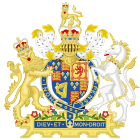Five Mile Act 1665 facts for kids
| Act of Parliament | |

|
|
| Long title | An Act for restraining Non-Conformists from inhabiting in Corporations. |
|---|---|
| Citation | 17 Cha. 2. c. 2 |
| Dates | |
| Royal assent | 31 October 1665 |
| Commencement | 9 October 1665 |
| Repealed | 29 July 1812 |
| Other legislation | |
| Repealed by | Places of Religious Worship Act 1812 |
|
Status: Repealed
|
|
| Text of statute as originally enacted | |
The Five Mile Act, also known as the Oxford Act or the Nonconformists Act 1665, was an important law passed in England in 1665. It was created by the Parliament of England to control people who did not follow the official Church of England. These people were called Nonconformists. The Act made it very difficult for Nonconformist religious leaders to live and work freely.
Contents
The Five Mile Act: What Was It?
The Five Mile Act was one of several laws known as the English penal laws. These laws aimed to make sure everyone in England followed the rules of the established Church of England. If you didn't follow these rules, you were considered a "non-conformist." The government wanted to stop people from having different religious practices.
Why Was This Act Created?
After the English Civil War, King Charles II wanted to restore order. He also wanted everyone to follow the Church of England. Many people, especially some Protestant ministers, had different ideas about how to worship. The government saw these differences as a threat to the king's power and the stability of the country.
What Did the Act Do?
The Five Mile Act placed strict rules on Nonconformist clergymen.
- It stopped them from living or visiting within five miles (about 8 kilometers) of any parish where they used to preach.
- They also couldn't come within five miles of any city or town that sent representatives to Parliament.
- The only way they could avoid these rules was to swear a special oath.
The Oath of Obedience
The oath required them to promise two main things:
- They would never try to go against the king.
- They would never try to change the government of the Church or the State.
This oath also meant they had to agree to the 1662 prayer book, which was the official prayer book of the Church of England.
Who Was Affected by the Act?
Thousands of Nonconformist ministers were greatly affected by this Act. Many lost their jobs and homes because they refused to swear the oath. They believed it went against their religious beliefs. This made life very hard for them and their families.
An Example of Impact
For example, Theodosia Alleine and her husband Joseph Alleine were forced to move. Joseph was a Nonconformist minister. They moved to a town called Taunton, but even there, they faced difficulties. They often had to move and stay with friends to avoid problems from those who disagreed with their beliefs. This shows how much the Act disrupted people's lives.
See also
- Conventicle Act 1664
- Religion in the United Kingdom
- Declaration of Indulgence (disambiguation)

